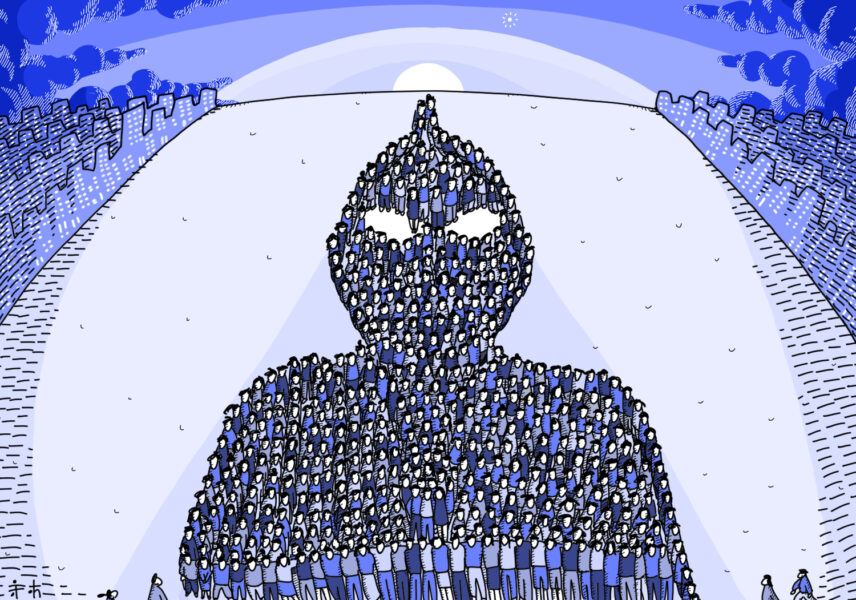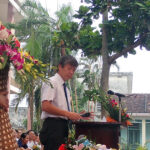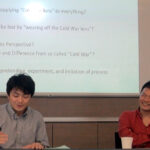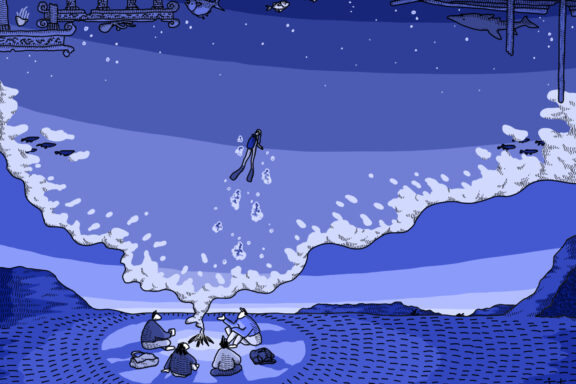Hiroyuki Yamamoto (Area Studies, Media Studies)
Ever since childhood, I have loved the Ultraman television series that features the Ultra superheroes. I vividly recall a scene in which an Ultra Hero, disguised in human form to protect Earth, tries to persuade an alien to abandon its plan to invade the planet. The alien replies, “But aren’t we both aliens from outer space?” At the time, I couldn’t fully grasp the philosophical implications of that line, but it stayed with me.
When I entered university and began contemplating my future, I came across a book titled Godzilla, Yamato, and Our Democracy. The author argues that the premises of iconic Japanese works such as Godzilla, Space Battleship Yamato, and Nausicaä of the Valley of the Wind are irrational from the perspective of international political realism. Such is the case with Ultra Heroes, who are willing to risk their lives to protect Earthlings—beings with whom they have no personal ties and whose civilizations are far less advanced. The author draws a comparison with postwar Japan’s passive reliance on the U.S. nuclear umbrella and calls for political and military self-reliance.
I found it intellectually stimulating to consider that widely beloved cultural works—known even to those who haven’t experienced them firsthand—carry the imprint of the time and society that produced them. Interpreting such works can reveal shared assumptions and prevailing norms. At the same time, I felt uneasy about the author’s view that receiving help is a sign of weakness and that the ideal is to become entirely self-sufficient. While this approach may offer a formal resolution to immediate challenges, it risks overlooking deeper structural issues and the value of interdependence.
Nonetheless, the book left a lasting impression and shaped the direction of my academic path. The question of why people so readily expect to be helped by outsiders continued to resonate as I pursued area studies. Why should I, a foreigner, research a region I do not belong to? What kind of value, if any, does my research provide to local people?
These questions accompanied me during my extended stay in Malaysia, especially in the state of Sabah, where I was struck by how warmly I was accepted as part of the community despite being an outsider. Although Malaysia appears to maintain clear boundaries between ethnic groups, I became intrigued by the less visible ways the society relies on outsiders and people of mixed heritage as mediators. This led me to focus on the Peranakan—individuals of mixed descent—as a lens through which to reinterpret Malaysia’s modern history. My research came to center on how diverse, foreign cultures encounter one another in Malaysia, creating new values that, through the Peranakan, circulate outward into the world.
This theme of cultural mediation surfaces in the 2022 reboot film Shin Ultraman. To better understand Earthlings, Ultraman, disguised as a human, visits the library and borrows Claude Lévi-Strauss’s The Savage Mind. I imagine Ultraman, hoping to understand human society through anthropology, asking, do the customs and systems of Earthlings, which seem to be primitive societies on a cosmic scale, have a universality that can be applied to space civilizations?
While Savage Mind is not a bad choice as a first book, if I had the opportunity, I would suggest that the Ultraman expand to Area Studies and read Benedict Anderson’s Imagined Communities next. Many readers think the book argues that humans imagine a community of shared destiny within a limited scope based on shared communication and exclude others who are different. However, at the heart of Anderson’s classic is the belief that people who fight for independence can unite. I would like to ask the Peranakan-like Ultra Heroes—who are both Earthling and alien—whether solidarity forged through the struggle for self-determination might hold not only across borders, but also across the stars.
Book List
佐藤健志 (Kenji Sato), ゴジラとヤマトとぼくらの民主主義 (Godzilla, Yamato, and Our Democracy), Bungeishunju, 1992.
Claude Lévi-Strauss, Wild Thought: A New Translation of “La Pensée sauvage,” Translated by Jeffrey Mehlman and John Leavitt, The University of Chicago Press, 2021.
Benedict Anderson, Imagined Communities: Reflections on the Origin and Spread of Nationalism, Verso, (1983) 2016.
(Illustration: Atelier Epocha)
This article is also available in Japanese. >>
「ウルトラマンと『想像の共同体』:
境界を越えるヒーローと想像力」
(山本博之)






